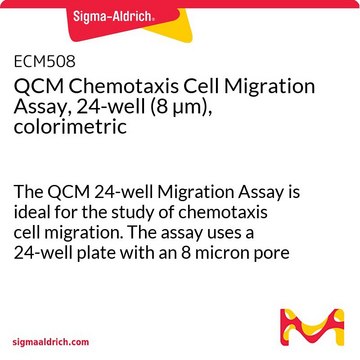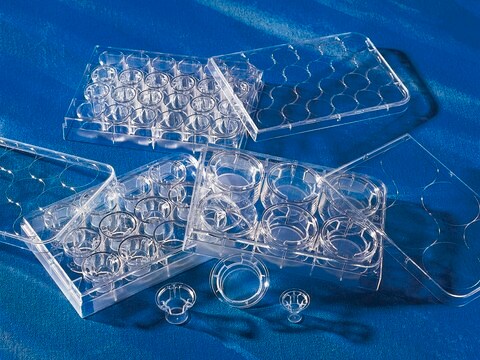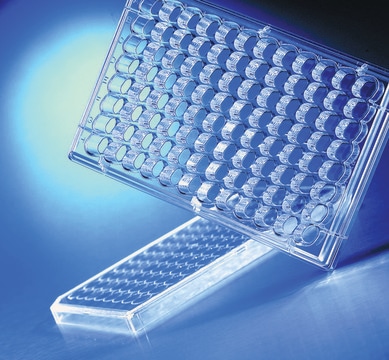ECM580
QCM Haptotaxis Cell Migration Assay -Fibronectin, 24-well, colorimetric
The QCM Haptotaxis Cell Migration Assay, 24-well plate -Fibronectin, Colorimetric is ideal for the study of epithelial & fibroblast cell haptotaxis.
Sign Into View Organizational & Contract Pricing
All Photos(1)
About This Item
UNSPSC Code:
12352207
eCl@ss:
32161000
NACRES:
NA.84
Recommended Products
Quality Level
species reactivity
vertebrates
manufacturer/tradename
Chemicon®
QCM
technique(s)
cell based assay: suitable
detection method
colorimetric
shipped in
wet ice
General description
Also available: Cell Comb Scratch Assay! Get biochemical data from a scratch assay!Click Here
Introduction
The CHEMICON QCM Haptotaxis Cell Migration Assay - Fibronectin, Colorimetric is ideal for the study of epithelial and fibroblast cell haptotaxis. The quantitative nature of this assay is especially useful for large scale screening of pharmacologic agents. BSA-coated control chambers provide an appropriate migration control. The 8 μm pore size of this assay′s Boyden chambers is not appropriate for the study of lymphocyte migration.
• Each kit provides sufficient materials for the evaluation of 12 samples.
• Please refer to the product insert for assay details.
The CHEMICON QCM Haptotaxis Cell Migration Assay - Fibronectin, Colorimetric assay is intended for research use only; not for diagnostic applications.
Introduction
The CHEMICON QCM Haptotaxis Cell Migration Assay - Fibronectin, Colorimetric is ideal for the study of epithelial and fibroblast cell haptotaxis. The quantitative nature of this assay is especially useful for large scale screening of pharmacologic agents. BSA-coated control chambers provide an appropriate migration control. The 8 μm pore size of this assay′s Boyden chambers is not appropriate for the study of lymphocyte migration.
• Each kit provides sufficient materials for the evaluation of 12 samples.
• Please refer to the product insert for assay details.
The CHEMICON QCM Haptotaxis Cell Migration Assay - Fibronectin, Colorimetric assay is intended for research use only; not for diagnostic applications.
Application
Research Category
Cell Structure
Cell Structure
Packaging
Sufficient for analysis of 12 samples
Components
Fibronectin Test Plate: (Part No. 2005689) One 24-well culture plate, containing 12 human FN-coated Boyden chambers, sufficient for the evaluation of 12 test samples.
BSA Control Plate: (Part No. 2005791) One 24-well culture plate, containing 12 BSA-coated Boyden chambers, sufficient for the evaluation of 12 controls.
Cell Stain Solution*: (Part No. 20294) One vial - 10 mL.
Extraction Buffer: (Part No. 20295) One vial - 10 mL.
24 well Stain Extraction Plate: (Part No. 2005871). One plate.
96 well Stain Quantitation Plate: (Part No. 2005870). One plate.
Swabs: (Part No. 10202) 50 each.
Forceps: (Part No. 10203) 1 pair
*Cell Stain Solution contains a small amount of crystal violet, which is toxic if swallowed or inhaled, and may cause irritation to the eyes, respiratory system, and skin. Handle with caution.
BSA Control Plate: (Part No. 2005791) One 24-well culture plate, containing 12 BSA-coated Boyden chambers, sufficient for the evaluation of 12 controls.
Cell Stain Solution*: (Part No. 20294) One vial - 10 mL.
Extraction Buffer: (Part No. 20295) One vial - 10 mL.
24 well Stain Extraction Plate: (Part No. 2005871). One plate.
96 well Stain Quantitation Plate: (Part No. 2005870). One plate.
Swabs: (Part No. 10202) 50 each.
Forceps: (Part No. 10203) 1 pair
*Cell Stain Solution contains a small amount of crystal violet, which is toxic if swallowed or inhaled, and may cause irritation to the eyes, respiratory system, and skin. Handle with caution.
Linkage
Replaces: ECM500
Storage and Stability
Store at 4°C for up to one year after date of purchase.
Legal Information
CHEMICON is a registered trademark of Merck KGaA, Darmstadt, Germany
Disclaimer
Unless otherwise stated in our catalog or other company documentation accompanying the product(s), our products are intended for research use only and are not to be used for any other purpose, which includes but is not limited to, unauthorized commercial uses, in vitro diagnostic uses, ex vivo or in vivo therapeutic uses or any type of consumption or application to humans or animals.
Signal Word
Danger
Hazard Statements
Precautionary Statements
Hazard Classifications
Eye Irrit. 2 - Flam. Liq. 2
Storage Class Code
3 - Flammable liquids
WGK
WGK 3
Certificates of Analysis (COA)
Search for Certificates of Analysis (COA) by entering the products Lot/Batch Number. Lot and Batch Numbers can be found on a product’s label following the words ‘Lot’ or ‘Batch’.
Already Own This Product?
Find documentation for the products that you have recently purchased in the Document Library.
Customers Also Viewed
Thamara J Abouantoun et al.
Molecular cancer therapeutics, 8(5), 1137-1147 (2009-05-07)
Platelet-derived growth factor (PDGF) receptor (PDGFR) expression correlates with metastatic medulloblastoma. PDGF stimulation of medulloblastoma cells phosphorylates extracellular signal-regulated kinase (ERK) and promotes migration. We sought to determine whether blocking PDGFR activity effectively inhibits signaling required for medulloblastoma cell migration
Astrid Hensel et al.
iScience, 25(6), 104355-104355 (2022-05-24)
The unique threonine protease Tasp1 impacts not only ordered development and cell proliferation but also pathologies. However, its substrates and the underlying molecular mechanisms remain poorly understood. We demonstrate that the unconventional Myo1f is a Tasp1 substrate and unravel the
Our team of scientists has experience in all areas of research including Life Science, Material Science, Chemical Synthesis, Chromatography, Analytical and many others.
Contact Technical Service











